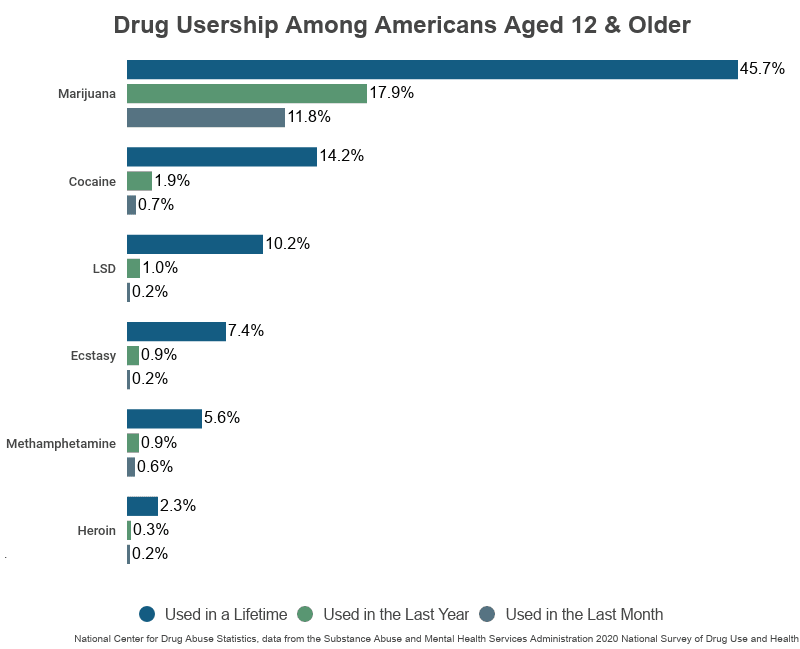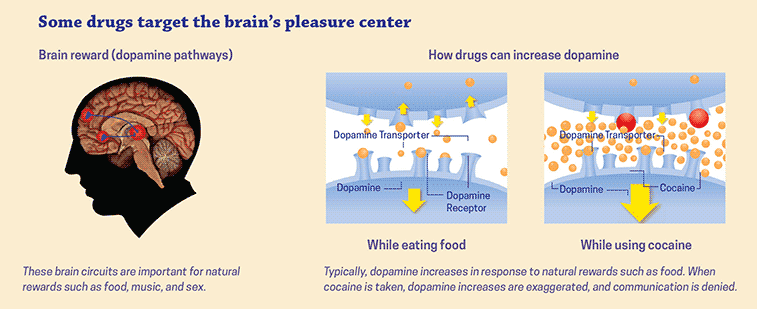
Drug Addiction is a serious problem that is starting to increase, especially in college students around the world.
Among Americans aged 12 years and older, 37.309 million were current illegal drug users (used within the last 30 days) as of 2020.

How Do Drugs Effect our Brain?
Drugs interfere with the way neurons send, receive, and process signals via neurotransmitters. Some drugs, such as marijuana and heroin, can activate neurons because their chemical structure mimics that of a natural neurotransmitter in the body. This allows the drugs to attach onto and activate the neurons.
Drugs, Brains, and Behavior: The Science of Addiction: Drugs and the Brain | NIDA (nih.gov)

How Can we Recover?
Recovery from addiction is not only possible, but also the rule, rather than the exception. According to the latest U. S. National Survey on Drug Use and Health, more than 75 percent of people addicted to alcohol or drugs recover—their condition improves, and substance use no longer dominates their life. That is not to say that recovery is easy. It is often a long and bumpy path, and relapse is nearly inevitable—but that doesn’t spell the end of recovery. There are coping strategies to be learned and skills to outwit cravings and practicing them not only tames the impulse to resume substance use but also gives people pride and a positive new identity that hastens recovery. (https://www.psychologytoday.com/)
Why Do People use Drugs?
1. Genetic Vulnerability
Individuals’ preferences to engage in one behavior versus another are shaped by their genetic endowment in interaction with their past experiences.
2. Cultural Attitudes
The value that a person attaches to using drugs is strongly influenced by the community in which the person lives (Wilson, 2005). For example, students drink more on campuses that have a strong drinking culture.
3. Financial Incentives
Evidence shows that people will stop using when the costs become too high (Dalrymple, 2006).
4. Personality
Impulsivity is a personality trait that has often been identified as a risk factor for alcohol and substance misuse (MacKillop, 2016).
5. Self-Medication
The self-medication theory of addiction suggests that suffering is at the heart of addictive disorders (Khantzian, 2012).
6. Loneliness
Addicts commonly lack enough positive human contacts to sustain happiness, and they resort to drug intake partly as self-medication (Panksepp, 2012).
Sources:
“7 Common Reasons Why People Use Drugs.” Psychology Today, Sussex Publishers, www.psychologytoday.com/us/blog/science-choice/201711/7-common-reasons-why-people-use-drugs. Accessed 25 Feb. 2024.
Bustamante, Jaleesa. “NCDAS: Substance Abuse and Addiction Statistics [2023].” NCDAS, 1 Jan. 2023, drugabusestatistics.org.
“Drugs and the Brain | National Institute on Drug Abuse.” National Institute on Drug Abuse, 22 Mar. 2022, nida.nih.gov/publications/drugs-brains-behavior-science-addiction/drugs-brain.
“Recovery from Addiction.” Psychology Today, Sussex Publishers, www.psychologytoday.com/us/basics/addiction/recovery-addiction. Accessed 23 Feb. 2024.
